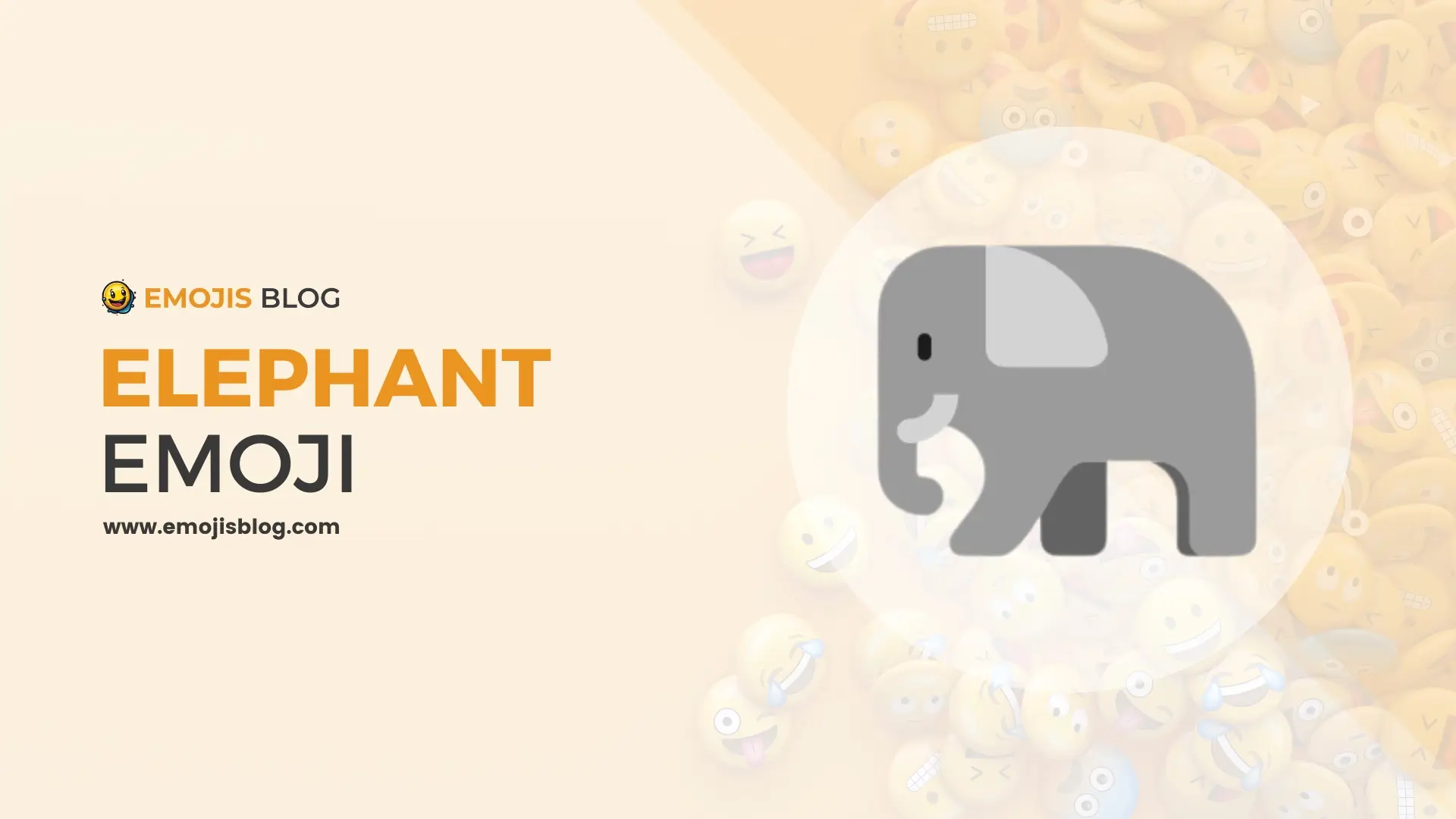What Does The Elephant Emoji 🐘 Mean?
🐘
Elephant Emoji 🐘 Meaning
The elephant emoji 🐘 symbolizes strength, wisdom, and loyalty, drawing from the elephant’s characteristics and its cultural significance across different societies. Elephants are revered for their size, power, and intelligence, making this emoji a representation of resilience and knowledge. Additionally, it can convey themes of family bonds and protection, as elephants are known for their close-knit social structures. The emoji is also used in religious and cultural contexts, especially in Hinduism, where the elephant-headed god Ganesha is a prominent figure, symbolizing the removal of obstacles and the granting of wisdom.
Technical Information
| Attribute | Details |
|---|---|
| Emoji | 🐘 |
| Unicode | U+1F418 |
| Name | Elephant |
| Category | Animals & Nature |
| Subcategory | Animal Mammal |
| Introduced in Unicode | Version 6.0 (2010) |
| Introduced in Emoji | Version 1.0 (2015) |
| Shortcodes | :elephant: |
| Keywords | elephant, animal, strength |
| Variations | None |
| Platforms Supported | All major platforms (iOS, Android, Windows, macOS) |
| Common Uses | Strength, wisdom, memory, loyalty, cultural significance |
| Associated Emoji | 🦏 (rhinoceros), 🐂 (ox), 🦣 (mammoth) |
Understanding the Elephant Emoji 🐘: Meaning and Usage
The elephant emoji 🐘 is a popular symbol used across various digital platforms and social media. While it may seem straightforward, the elephant emoji carries diverse meanings depending on the context in which it is used. This article delves into the symbolism, cultural significance, and common uses of the elephant emoji.
The Symbolism of the Elephant
1. Strength and Power
Elephants are often associated with strength and power. They are the largest land animals on Earth, known for their immense size and strength. As a result, the elephant emoji 🐘 is frequently used to symbolize these traits. It might be used to represent physical strength or the idea of someone having a strong, resilient character.
2. Wisdom and Intelligence
Elephants are also known for their intelligence and memory. In many cultures, they are seen as wise creatures. The phrase “an elephant never forgets” reflects this association. Consequently, the elephant emoji can be used to convey wisdom, knowledge, or a good memory.
3. Loyalty and Family
Elephants are highly social animals that live in close-knit family groups. They are known for their loyalty to their herd and their protective nature towards their young. The elephant emoji 🐘, therefore, can also represent loyalty, family bonds, and strong relationships.
Cultural Significance of the Elephant
1. Elephants in Hinduism and Buddhism
In Hinduism, the elephant is a sacred animal, primarily associated with the god Ganesha, who has the head of an elephant. Ganesha is revered as the remover of obstacles, the patron of arts and sciences, and the god of intellect and wisdom. The elephant emoji 🐘 might be used in contexts related to these religious beliefs or to invoke the blessings of Ganesha.
In Buddhism, elephants are also significant. The white elephant, in particular, is a symbol of mental strength and is believed to bring good luck. Therefore, the emoji can also have a spiritual or religious connotation, depending on the user’s background.
2. Elephants in African Culture
In various African cultures, elephants are symbols of royalty and power. They are often regarded as the king of animals and are associated with leadership and authority. The elephant emoji can thus carry a sense of dignity, respect, and power in communications influenced by African cultural perspectives.
Common Uses of the Elephant Emoji 🐘
1. Expressing Physical or Emotional Strength
When someone wants to emphasize their strength or endurance, whether physical or emotional, they might use the elephant emoji. For example, it could accompany a message about overcoming a challenge or showing resilience in difficult times.
2. Representing Memory or Wisdom
The elephant emoji is sometimes used in discussions involving knowledge, experience, or memory. It might be added to a message that reflects on past experiences, lessons learned, or sage advice.
3. Highlighting Loyalty or Family Bonds
In conversations about family, friends, or strong relationships, the elephant emoji 🐘 can be used to emphasize loyalty and the deep bonds that exist within close-knit groups. It is a way to express appreciation for someone’s steadfastness or to underline the importance of family.
4. Spiritual or Cultural References
Given its religious significance, the elephant emoji is often used during festivals, holidays, or in religious contexts, especially those related to Hinduism or Buddhism. It can also be used to celebrate cultural events or to express pride in one’s cultural heritage.
Variations and Related Emojis
There are no direct variations of the elephant emoji 🐘, but it can be used alongside other animal emojis to convey different meanings. For instance:
- 🦣 (Mammoth): Represents prehistoric times or something ancient.
- 🦏 (Rhinoceros): Similar to the elephant, this emoji can also symbolize strength and resilience.
- 🐂 (Ox): Often used in contexts related to strength, determination, and hard work.
Combining these emojis can create more complex messages or highlight specific attributes associated with the elephant.
Conclusion
The elephant emoji 🐘 is a versatile symbol with rich meanings that go beyond its simple depiction of an animal. Whether representing strength, wisdom, loyalty, or cultural significance, it is a powerful tool for communication in the digital world. Understanding its various connotations can enhance how we use this emoji in our daily interactions, making our messages more meaningful and expressive.

